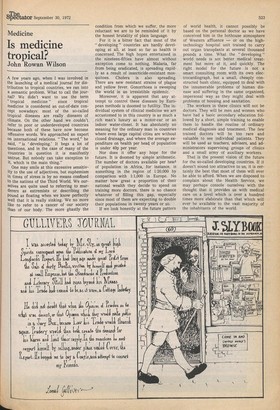Is medicine tropical?
John Rowan Wilson
A few years ago, when I was involved in the launching of a medical journal for distribution to tropical countries, we ran into a semantic problem. What to call the journal? We didn't want to use the term "tropical medicine " since tropical medicine is considered an out-of-date concept nowadays: most of the so-called tropical diseases are really diseases of climate. On the other hand we couldn't refer to poor or underdeveloped countries because both of these have now become offensive words. We approached an expert on international relations. "The word," he said, "is 'developing.' It begs a lot of questions, and in the case of many of the countries in question it is manifestly untrue. But nobody can take exception to it, which is the main thing."
One may smile at this excessive sensitivity to the use of adjectives, but euphemism in times of stress is by no means confined to the nations of the Third World. We ourselves are quite used to referring to murderers as extremists or describing the Pound as floating when we know perfectly Well that it is really sinking. We no more like to refer to a cancer of our society than of our body. The more ghastly the condition from which we suffer, the more reluctant we are to be reminded of it by the honest brutality of plain language.
For it is a bitter fact that most of the " developing " countries are hardly developing at all, at least so far as health is concerned. The high hopes entertained in the nineteen-fifties have almost without exception come to nothing. Malaria, far from being eradicated, is spreading rapidly as a result of insecticide-resistant mosquitoes. Cholera is also spreading. There are new resistant strains of plague and, yellow fever. Gonorrhoea is sweeping the world in an irresistible epidemic.
Moreover, it is apparent that any attempt to control these diseases by European methods is doomed to futility. The individual system of clinical medicine we are accustomed to in this country is as much a rich man's luxury as a motor-car or an indoor water-closet. It has absolutely no meaning for the ordinary man in countries where even large capital cities are without closed drainage, and where the average expenditure on health per head of population is under 40p per year.
Nor does it offer any hope for the future. It is doomed by simple arithmetic. 'The number of doctors available per head of population in Africa, for instance, is something in the region of 1:20,000 by comparison with 1:1,000 in Europe. No matter how great a proportion of their national wealth they decide to spend on training more doctors, there is no chance whatever of filling this gap, especially since most of them are expecting to double their populations in twenty years or so.
If we look honestly at the future pattern
of world health, it cannot possibly be based on the personal doctor as we have conceived him in the hothouse atmosphere of Western affluence — or on the hightechnology hospital unit trainect to carry out organ transplants at several thousand pounds a time. What the "developing " world needs is not better medical treatment but more of it, and quickly. The right model for the future is not a smart consulting room with its own electrocardiograph, but a small, cheaply constructed bush clinic, equipped to deal with the innumerable problems of human disease and suffering in the same organised, impersonal way as they might deal with problems of housing and sanitation.
The workers in these clinics will not be doctors. They will be men and women who have had a basic secondary education followed by a short, simple training to enable them to handle the routine of ordinary medical diagnosis and treatment. The few trained, doctors will be too rare and valuable to see individual patients. They will be used as teachers, advisers, and administrators supervising groups of clinics ana a small army of auxiliary workers.
That is the present vision of the future for the so-called developing countries. If it doesn't sound too attractive to us, it is certainly the best that most of them will ever be able to afford. When we are disposed to complain about the Health Service, we may perhaps console ourselves with the thought that it provides us with medical care on a level which is over a hundred times more elaborate than that which will ever be available to the vast majority of the inhabitants of the world.










































 Previous page
Previous page